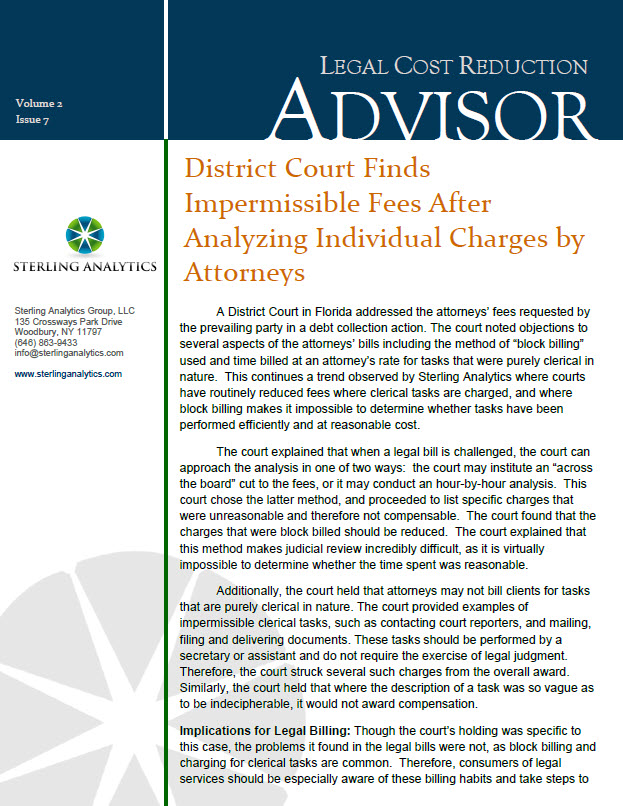A District Court in Florida addressed the attorneys’ fees requested by the prevailing party in a debt collection action. The court noted objections to several aspects of the attorneys’ bills including the method of “block billing” used and time billed at an attorney’s rate for tasks that were purely clerical in nature. This continues a trend observed by Sterling Analytics where courts have routinely reduced fees where clerical tasks are charged, and where block billing makes it impossible to determine whether tasks have been performed efficiently and at reasonable cost.
The court explained that when a legal bill is challenged, the court can approach the analysis in one of two ways: the court may institute an “across the board” cut to the fees, or it may conduct an hour-by-hour analysis. This court chose the latter method, and proceeded to list specific charges that were unreasonable and therefore not compensable. The court found that the charges that were block billed should be reduced. The court explained that this method makes judicial review incredibly difficult, as it is virtually impossible to determine whether the time spent was reasonable.
Additionally, the court held that attorneys may not bill clients for tasks that are purely clerical in nature. The court provided examples of impermissible clerical tasks, such as contacting court reporters, and mailing, filing and delivering documents. These tasks should be performed by a secretary or assistant and do not require the exercise of legal judgment. Therefore, the court struck several such charges from the overall award. Similarly, the court held that where the description of a task was so vague as to be indecipherable, it would not award compensation.
Implications for Legal Billing: Though the court’s holding was specific to this case, the problems it found in the legal bills were not, as block billing and charging for clerical tasks are common. Therefore, consumers of legal services should be especially aware of these billing habits and take steps to prevent them. As the court noted, time entries that are block billed compound several tasks into one single entry and make it impossible to determine the amount of time spent on each task. Therefore, it is important to have a written policy in place prior to the legal representation that states that all entries that are block billed will be stricken from the legal fee. This will require the attorney to note each task separately and the client will be better able to approve of each charge.
It is also improper for an attorney to bill for tasks that are purely clerical in nature. These tasks are actually part of firm overhead, and can be completed by a secretary or assistant. By stating such a requirement in the billing guidelines, the client decreases the likelihood of paying for clerical and administrative tasks.
Finally, there is something to be learned from the court’s review of the attorney bills in this case. The court went through the legal bills hour-by-hour to determine whether each item was proper. While this may be time consuming, it is the best approach for reducing legal costs. As a client, it may not be clear whether a particular billing entry is proper, and therefore enlisting the assistance of a service like Sterling Analytics ensures your legal bills are thoroughly assessed and that you only pay for those attorneys’ fees that are appropriate and permissible.
* Zachloul v. Fair Debt Collections & Outsourcing, 2010 WL 1730789 (M.D. Fla. 2010). Full copies of court decisions may be available through counsel or through various Internet links or paid services.
By Lauren Stulmaker


